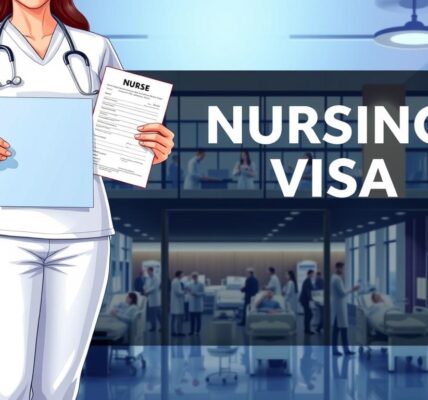Caregiver Visa Sponsorship in the UK Unveiled: Sponsorship Certificates, Salary Thresholds, and Settlement Options
The healthcare sector in the UK is experiencing a significant demand for skilled professionals, particularly in caregiving roles.
With over 150,000 vacancies reported by the Home Office, there is a growing need for international talent to fill these positions. This has opened doors for many, including Nigerian professionals, to explore rewarding opportunities abroad.
This guide delves into key aspects such as sponsorship certificates, salary requirements, and pathways to settlement. Recent changes in immigration rules, especially those affecting dependant visas as of April 2024, have made it essential for applicants to stay informed. Understanding these updates can help streamline the process for those aiming to build a career in the UK.
Whether you’re exploring eligibility criteria or permanent residency options, this comprehensive resource aims to provide clarity. For Nigerian professionals, this represents a chance to contribute to a vital sector while advancing their careers on an international stage.
For more information explore the official visa website mentioned in this article:
You will be redirected to another website
Introduction to Caregiver Visa Sponsorship in the UK
The UK’s health care system is actively seeking skilled workers to address its growing workforce shortages. With over 150,000 vacancies in the care sector, there is a pressing need for qualified professionals to fill these roles. This demand has led to the evolution of the Health and Care Worker visa program, designed to attract international talent.
This worker visa program offers opportunities in both NHS roles and private care homes. While NHS positions often come with structured benefits, private care roles provide flexibility and diverse work environments. Both paths allow individuals to contribute to the UK’s health care system while advancing their careers.
The visa duration typically spans up to five years, with the potential for settlement after meeting specific criteria. However, recent changes have introduced restrictions for dependants in certain roles, such as SOC 6135 and 6136. These updates highlight the importance of staying informed about visa application requirements.
For Nigerian professionals, platforms like Fasthire play a crucial role in connecting candidates with UK employers. This partnership simplifies the process of securing a work visa and ensures a smooth transition into the UK’s health care sector.
Understanding the Caregiver Visa Sponsorship UK
The UK’s health care sector offers structured pathways for international professionals seeking roles in caregiving. The Health and Care Worker visa program is designed to address workforce shortages by attracting skilled individuals. This program provides opportunities for both entry-level and senior positions, categorized under SOC codes 6135 and 6136.
Care workers under SOC 6135 typically handle basic caregiving tasks, while senior care workers (SOC 6136) take on supervisory roles. Employers in England must be registered with the Care Quality Commission (CQC) to sponsor international workers. This ensures that care standards are maintained across the sector.
The visa is valid for up to five years, with options for extension. However, applicants must adhere to specific rules, such as avoiding claims to public funds or unauthorized employment. These visa requirements are essential for maintaining compliance and securing long-term opportunities.
Sponsorship opportunities are available in both the NHS and private sectors. The NHS offers structured benefits, while private employers provide flexibility and diverse work environments. Both options require a licensed sponsor to facilitate the application process.
| Role | SOC Code | Responsibilities |
|---|---|---|
| Care Worker | 6135 | Basic caregiving tasks, personal care, and support |
| Senior Care Worker | 6136 | Supervisory duties, training, and advanced care |
For Nigerian professionals, understanding these distinctions is crucial when applying for jobs visa in the UK. Platforms like Fasthire can assist in connecting candidates with licensed sponsors, ensuring a smooth transition into the health care sector.
Eligibility Criteria for Caregiver Visa Sponsorship
To qualify for roles in the health care sector, applicants must meet specific eligibility criteria. These requirements ensure that candidates are well-prepared to contribute effectively to the industry. Understanding these standards is essential for a successful application.
Basic Requirements
Applicants must fulfill several key prerequisites. Age and criminal record checks are mandatory to ensure suitability for care roles. Educational qualifications, such as care certifications or diplomas, are also required. These documents must align with the RQF Level 3 equivalency standard.
Experience in the field is another critical factor. At least one year of clinical experience is preferred, as it demonstrates practical skills. Additionally, applicants must pay the health surcharge to access the National Health Service during their stay.
For Nigerian professionals, document authentication is a crucial step. Proper verification ensures that all submitted materials meet the necessary standards.
Language Proficiency
Proficiency in the english language is a non-negotiable requirement. Applicants must achieve a minimum IELTS score of 5.0 or provide equivalent proof of language skills. Exemptions may apply for those from English-speaking countries or with prior qualifications in English.
“Language proficiency is not just a requirement; it’s a bridge to effective communication in care roles.”
Meeting these criteria ensures that candidates are well-equipped to handle the demands of caregiving. By adhering to these standards, applicants can enhance their chances of securing a position in the health care sector.
Sponsorship Certificates: What You Need to Know
Securing a certificate of sponsorship (CoS) is a critical step for international professionals aiming to work in the UK. This document, issued by a licensed sponsor, confirms that the applicant has a valid job offer. Without it, the application process cannot proceed.
The CoS issuance process involves several steps. First, the employer must apply for a sponsorship license if they don’t already have one. Once approved, they can assign a CoS to the applicant. This digital record includes details like job title, salary, and start date.
Employers have specific obligations when creating a CoS. They must ensure the information is accurate and meets immigration rules. Errors, such as incorrect job codes or salary details, can lead to application rejections.
“A well-prepared CoS is the foundation of a successful visa application.”
The CoS is valid for three months from the date of issue. If the applicant doesn’t use it within this period, the employer must apply for a new one. Renewal procedures are straightforward but require careful attention to detail.
Common CoS errors include mismatched job titles, incomplete salary information, and incorrect SOC codes. These mistakes can delay or derail the application process. Employers can track CoS allocations through the Sponsor Management System (SMS), ensuring transparency and efficiency.
For Nigerian professionals, document verification is a crucial step. All supporting materials, such as educational certificates and work experience records, must be authenticated. This ensures compliance with UK immigration standards.
| CoS Requirement | Details |
|---|---|
| Cost | £536 – £1,476 |
| Validity | 3 months |
| Common Errors | Incorrect job codes, salary details |
Understanding the CoS process is essential for a smooth transition into the UK job market. By adhering to these guidelines, applicants can avoid common pitfalls and enhance their chances of success.
Salary Thresholds for Caregiver Visa Sponsorship
Understanding salary expectations is crucial for professionals aiming to work abroad. For roles in the health sector, the minimum threshold is a key factor in determining eligibility. Currently, the baseline for care workers is set at £23,200 annually.
Senior care workers, on the other hand, have a higher benchmark. Their standard salary is £30,960, reflecting their additional responsibilities. Employers must ensure these figures are maintained throughout the employment period.
Overtime and holiday pay are also important considerations. These are calculated based on the hourly rate of £11.90. Such benefits ensure fair compensation for extra hours worked.
“Meeting the minimum threshold is not just a requirement; it’s a step toward financial stability in a new country.”
For Nigerian professionals, this salary structure offers a significant upgrade compared to local averages. Employers often provide additional benefits like accommodation allowances, making the transition smoother.
- Current £23,200 minimum for care workers (SOC 6135)
- Senior care worker salary benchmarks (£30,960 standard)
- Overtime calculations and holiday pay considerations
- Comparison with average Nigerian care salaries
- Employer obligations for salary maintenance
- Accommodation allowances and benefits packages
Application Process for Caregiver Visa Sponsorship
Navigating the application process for international roles requires careful planning and attention to detail. This section provides a step-by-step guide to help applicants understand the requirements and avoid common pitfalls.
Step-by-Step Guide
The first step is to gather all necessary documents. These include a valid passport, a tuberculosis (TB) test certificate, and a police clearance certificate. These materials are essential for verifying identity and health status.
Next, applicants must complete the online visa application form. This involves providing personal details, employment history, and information about the sponsoring employer. Accuracy is crucial to avoid delays.
After submitting the form, applicants must schedule a biometric appointment. In Nigeria, enrollment centers are available in major cities like Lagos and Abuja. This step involves fingerprinting and photographing for identity verification.
Once biometrics are completed, the application enters the processing time phase. Standard processing takes 3-5 months, but priority options are available for faster results. Applicants should monitor their application status regularly.
Common Challenges and Solutions
One frequent issue is delays in document verification. To address this, applicants should ensure all documents are authenticated and translated if necessary. Early preparation can prevent last-minute complications.
Another challenge is disclosing previous visa refusals. Honesty is critical; applicants must provide detailed explanations and supporting evidence to strengthen their case.
Lastly, understanding the difference between priority and standard processing time can help applicants make informed decisions. Priority processing is ideal for those with tight deadlines.
| Document | Purpose |
|---|---|
| Passport | Identity verification |
| TB Test Certificate | Health clearance |
| Police Certificate | Criminal record check |
By following these steps and addressing potential challenges, applicants can streamline their visa application process. Proper preparation ensures a smoother journey toward securing international opportunities.
Benefits of Working as a Caregiver in the UK
Working in the UK’s health sector offers numerous advantages for international professionals. These benefits extend beyond financial rewards, providing opportunities for growth and stability. For Nigerian professionals, this represents a chance to enhance their careers while enjoying a supportive work environment.
One key advantage is access to professional development programs. Employers often provide training sessions to help workers improve their skills. This focus on growth ensures that employees stay updated with the latest practices in the healthcare field.
Another significant benefit is the inclusion in UK pension schemes. This long-term financial security is a major draw for many international workers. Additionally, spousal employment privileges allow partners to work, making the transition smoother for families.
After five years of continuous employment, workers can apply for Indefinite Leave to Remain (ILR). This pathway to permanent residency is a valuable incentive for those looking to settle in the UK. It also opens doors to further career and personal opportunities.
For Nigerian professionals, the benefits of working in the UK often surpass those available locally. Higher salaries, better working conditions, and access to advanced healthcare systems are just a few examples. Cultural integration programs further support newcomers in adapting to their new environment.
| Benefit | UK | Nigeria |
|---|---|---|
| Professional Development | Structured programs | Limited opportunities |
| Pension Schemes | Inclusive and secure | Less comprehensive |
| Spousal Employment | Allowed and supported | Restricted |
| Pathway to ILR | Available after 5 years | Not applicable |
These advantages make the UK an attractive destination for those seeking to advance their careers in the health sector. By understanding these benefits, professionals can make informed decisions about their future.
Settlement Options for Caregivers in the UK
For international professionals, the UK offers clear pathways to long-term residency. One of the most sought-after options is Indefinite Leave to Remain (ILR), which provides stability and opens doors to further opportunities. To qualify, applicants must meet specific criteria, including continuous residence and good character assessments.
One key requirement is living in the UK for at least 5 years without significant breaks. During this period, applicants must maintain compliance with immigration rules. Any extended absences could affect eligibility, so careful planning is essential.
Another critical step is passing the Life in the UK test. This exam assesses knowledge of British history, culture, and values. Preparation is vital, as passing the test is mandatory for indefinite leave applications.
Financial stability is also a factor. Applicants must provide proof of sufficient funds to support themselves and any dependents. This ensures they can contribute positively to society without relying on public funds.
For Nigerian nationals, the process includes additional considerations. Family reunion options are available post-ILR, allowing loved ones to join the applicant in the UK. Naturalization timelines vary, but the journey to citizenship begins with achieving settlement.
| Requirement | Details |
|---|---|
| Continuous Residence | Minimum 5 years in the UK |
| Life in the UK Test | Mandatory for ILR applications |
| Financial Proof | Evidence of self-sufficiency |
| Good Character | No criminal record or immigration violations |
Understanding these requirements is crucial for a successful application. By meeting these standards, professionals can secure their future in the UK and enjoy the benefits of permanent residency.
Top Companies Offering Caregiver Visa Sponsorship
Several organizations are leading the way in hiring international talent for caregiving roles. These companies and agencies provide structured pathways for professionals seeking rewarding opportunities abroad. Their focus on specialized care ensures that workers can contribute meaningfully to the sector.
Among the top employers are Marie Curie, A1 Care, and Agincare. These companies specialize in areas like elderly care and disability support. They offer comprehensive recruitment processes, including detailed application portals and direct contact options.
Employer reputation is a key factor for international workers. Many of these agencies are highly rated for their supportive work environments and fair treatment of staff. Nigerian professionals, in particular, find these organizations appealing due to their inclusive policies and retention rates.
Typical benefit packages include competitive salaries, training opportunities, and accommodation allowances. These perks make the transition smoother for international workers. Below is a comparison of key features offered by leading employers:
- Marie Curie: Specializes in palliative care, offers professional development programs.
- A1 Care: Focuses on elderly support, provides accommodation allowances.
- Agincare: Known for disability care, includes comprehensive training sessions.
For those seeking international opportunities, these companies and agencies stand out as reliable options. Their commitment to quality care and employee satisfaction makes them leaders in the field.
How to Find Caregiver Jobs with Visa Sponsorship
Finding the right job with sponsorship requires a strategic approach. Professionals must focus on platforms like NHS Jobs and Carehome.co.uk to find suitable opportunities. These platforms list verified roles and provide detailed application instructions.
Optimizing LinkedIn profiles is another effective method. Recruiters often search for candidates with clear profiles highlighting relevant skills. Including keywords like jobs visa and care metrics can improve visibility.
Writing a UK-style CV is essential. It should emphasize achievements, certifications, and measurable outcomes. Tailoring the CV to each job increases the chances of being shortlisted.
- Use platforms like NHS Jobs and Carehome.co.uk to find roles.
- Optimize LinkedIn profiles with relevant keywords.
- Create a UK-style CV with care metrics.
- Cold-email CQC-registered homes directly.
- Be cautious of sponsorship scams and verify employers.
- Leverage Fasthire’s job matching services.
- Network through Nigerian diaspora associations.
Cold-emailing CQC-registered homes can also yield results. A well-crafted email expressing interest and attaching a CV can make a strong impression. Always verify the employer’s legitimacy to avoid scams.
Using Fasthire’s job matching services simplifies the process. Their platform connects candidates with verified employers, ensuring a smooth application process. Networking through Nigerian diaspora associations can also open doors to unadvertised roles.
By following these strategies, professionals can increase their chances of securing a sponsored role. Preparation and persistence are key to success in this competitive field.
Caregiver Visa Sponsorship: Legal and Compliance Aspects
Understanding the legal framework is essential for professionals working abroad. Adhering to regulations ensures a smooth transition into the workforce and helps avoid potential pitfalls. This section explores key legal and compliance aspects that both employers and employees must consider.
Employers have specific reporting obligations to the home office. They must notify authorities of any changes in employment status, such as absences or terminations. Failure to comply can result in penalties or even the revocation of the sponsor license.
Employees also have rights under UK employment law. These include fair wages, safe working conditions, and protection against discrimination. Understanding these rights is crucial for maintaining a positive work environment.
Workplace disputes can arise, and knowing how to handle them is important. Employees should follow internal grievance procedures before escalating issues to external bodies like the Employment Tribunal.
Modifying visa conditions is another critical area. Changes in job roles or locations must be reported to the home office to ensure continued compliance. Overstaying a visa can have serious consequences, including deportation and bans on re-entry. However, remedies like applying for an extension or appealing a decision are available.
Data protection is also a key consideration. Employers must adhere to the General Data Protection Regulation (GDPR) when handling employee information. This includes obtaining consent and ensuring data security.
| Aspect | Details |
|---|---|
| Employer Reporting | Notify home office of employment changes |
| Employee Rights | Fair wages, safe conditions, anti-discrimination |
| Workplace Disputes | Follow internal procedures before escalation |
| Visa Modifications | Report changes in job roles or locations |
| Overstaying | Consequences include deportation and bans |
| Data Protection | Comply with GDPR for employee information |
By understanding these legal and compliance aspects, professionals can ensure a successful and stable experience in their new roles. Staying informed about regulations is key to avoiding issues and building a rewarding career.
Tips for a Successful Caregiver Visa Application
A well-prepared application can significantly improve the chances of success. For Nigerian applicants, understanding the process and avoiding common pitfalls is essential. Here are some tips to ensure a smooth experience.
One of the most common reasons for refusal is incomplete or inaccurate documentation. Applicants should double-check all forms and ensure professional credentials are translated into English by certified services. This step is crucial for meeting application standards.
Mock interviews can also help applicants prepare for the actual process. Practicing responses to common questions builds confidence and ensures clarity during the interview. Additionally, financial evidence must be formatted correctly, with bank statements and salary slips presented in the required manner.
Managing stress is another important aspect. Applicants should stay organized and seek support from friends or family. Post-submission follow-up protocols, such as tracking application status, can also help reduce anxiety.
- Verify all documents for accuracy and completeness.
- Use certified translation services for professional credentials.
- Conduct mock interviews to build confidence.
- Format financial evidence as per guidelines.
- Stay organized and seek support to manage stress.
- Track application status regularly after submission.
By following these tips, applicants can enhance their chances of a successful outcome. Proper preparation and attention to detail are key to navigating the process effectively.
Caregiver Visa Sponsorship: Frequently Asked Questions
Many applicants have questions about the process of securing a role abroad. This faq section addresses common concerns and provides clarity on key aspects. Whether you’re curious about processing times or dependant rules, these answers aim to help simplify your journey.
- Are there age limit exceptions? While most roles require applicants to be 18 or older, certain positions may have specific age criteria. Always check the job description for details.
- How do I switch employers? You must notify the authorities and ensure your new employer is a licensed sponsor. Failure to do so can affect your status.
- Can I study part-time? Yes, part-time study is permitted as long as it does not interfere with your primary role. Ensure your visa conditions allow this.
- What if I need emergency travel documentation? Contact the nearest embassy or consulate for assistance. They can issue temporary travel documents if needed.
- Which countries are exempt from TB tests? Applicants from certain countries, like the USA or Australia, may not require a TB test. Check the official list for exemptions.
- What if my application is rejected? You can appeal the decision or reapply after addressing the reasons for refusal. Professional advice is recommended.
“Understanding the rules and preparing thoroughly can make the process smoother and less stressful.”
These answers aim to help applicants navigate the process with confidence. For more detailed information, consult official guidelines or seek professional advice.
Conclusion: Your Path to Caregiver Visa Sponsorship in the UK
Embarking on a journey to work abroad can be both exciting and challenging. For Nigerian professionals, understanding the key requirements and timelines is essential for a smooth transition. From securing the necessary documents to meeting eligibility criteria, preparation is the cornerstone of success.
A final checklist can help applicants stay organized. Ensure all forms are completed accurately, and professional credentials are translated by certified services. Mock interviews and proper financial evidence formatting can further enhance your application.
Many have walked this path before and achieved remarkable results. Their stories serve as motivation, proving that with dedication, long-term career progression is within reach. Resources like Fasthire and Nigerian diaspora associations provide ongoing support throughout the process.
Looking ahead, the future holds immense potential for those willing to take the first step. For personalized guidance, consider consulting professionals who can help navigate the complexities of the application process. Your journey starts here.
FAQ
What is a sponsorship certificate, and why is it important?
A sponsorship certificate is a document issued by a licensed employer to support a work permit application. It proves the employer is willing to hire and sponsor the applicant, which is a key requirement for the process.
What are the salary thresholds for this type of work permit?
The salary thresholds vary depending on the role and experience level. Employers must ensure the pay meets the minimum requirements set by the Home Office to qualify for sponsorship.
How long does the application process take?
The processing time can vary, but it typically takes several weeks. Applicants should prepare all necessary documents in advance to avoid delays.
What are the basic eligibility criteria for this permit?
Applicants must meet specific requirements, including proof of qualifications, relevant experience, and English language proficiency. Employers must also hold a valid sponsorship license.
Can caregivers apply for settlement in the UK?
Yes, after meeting certain conditions, such as working in the country for a specific number of years, caregivers may be eligible to apply for permanent residency.
What are the common challenges during the application process?
Challenges include gathering the correct documents, meeting language requirements, and ensuring the employer’s sponsorship license is valid. Proper preparation can help overcome these issues.
How can caregivers find jobs with sponsorship support?
Caregivers can search for roles through job boards, recruitment agencies, or directly on employer websites. It’s important to verify the employer’s sponsorship license before applying.
What legal aspects should caregivers be aware of?
Caregivers must ensure their employer complies with UK immigration laws. This includes verifying the sponsorship license and understanding the terms of the work permit.
What tips can improve the chances of a successful application?
Applicants should double-check all documents, meet language requirements, and ensure their employer is a licensed sponsor. Seeking professional advice can also be beneficial.
Published on: 29 de May de 2025





